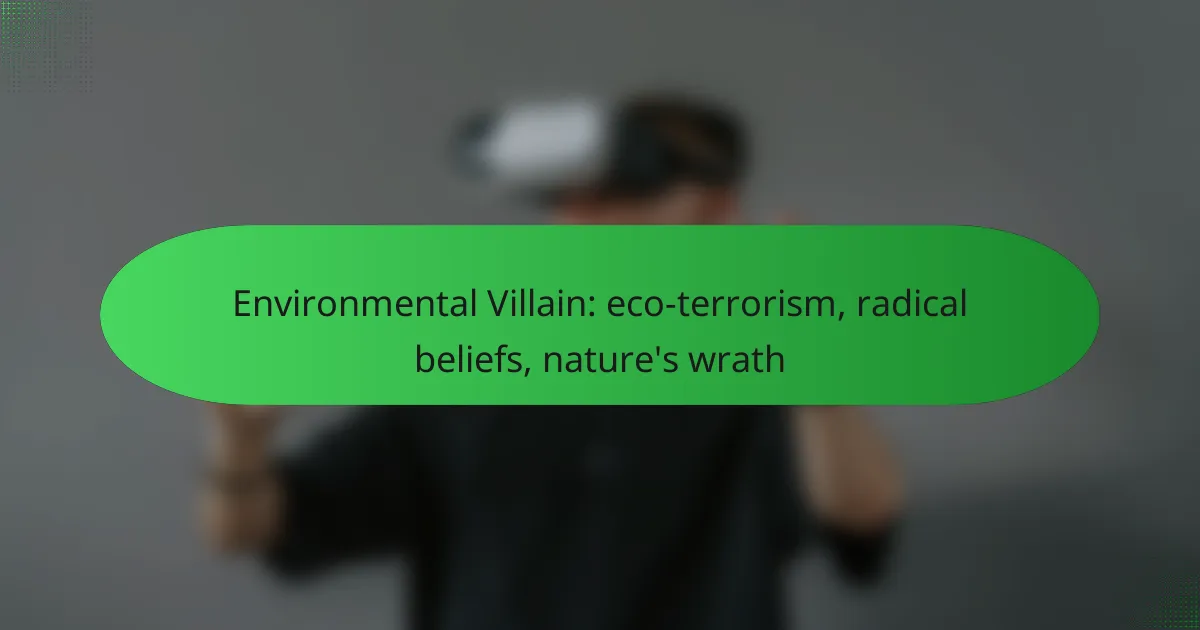Eco-terrorism represents a radical response to environmental degradation, where individuals or groups resort to violence in the belief that such actions are necessary to protect nature. Driven by a sense of urgency and radical ideologies, these acts can instill fear and provoke backlash against legitimate environmental movements, complicating the discourse surrounding conservation efforts. As these extreme beliefs take root, they often frame nature as a victim of human exploitation, leading to a cycle of conflict that undermines constructive dialogue on climate action.
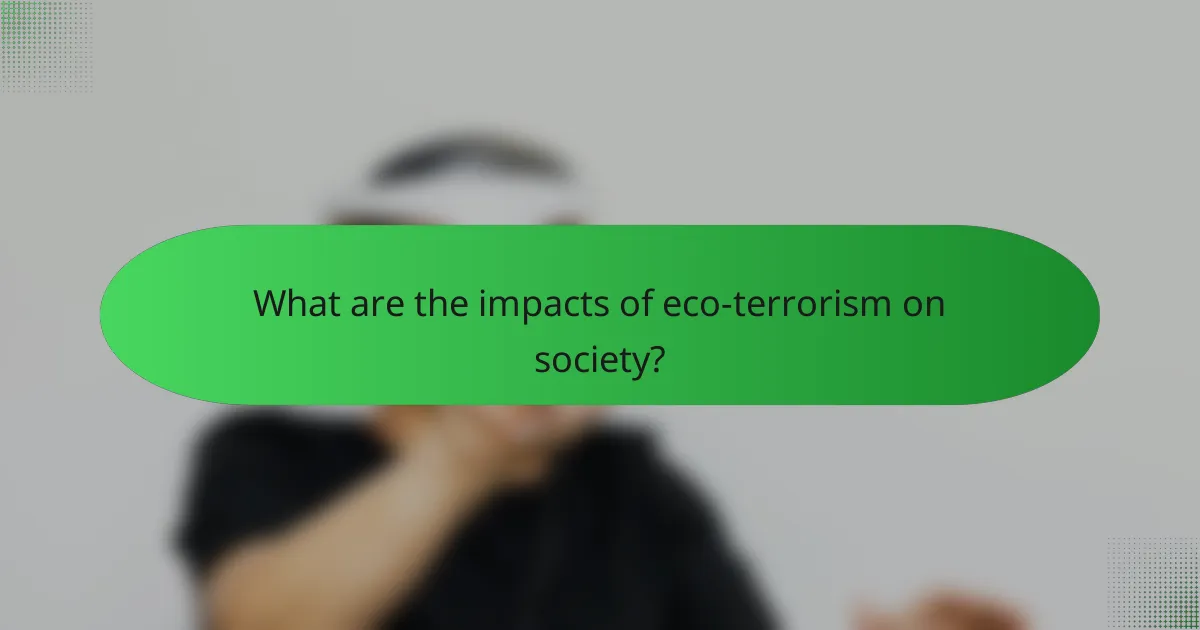
What are the impacts of eco-terrorism on society?
Eco-terrorism significantly affects society by instilling fear, provoking backlash against environmental causes, and leading to legal consequences for activists. These impacts can undermine legitimate environmental efforts and complicate the dialogue around conservation and climate action.
Increased fear and anxiety
Eco-terrorism generates heightened fear and anxiety among the public, as violent acts or threats can create a sense of insecurity. Communities may worry about the potential for property damage or harm, leading to a general mistrust of environmental groups.
This fear can also extend to businesses and governments, which may feel pressured to adopt stricter security measures or distance themselves from environmental initiatives. The result is a chilling effect on open dialogue about environmental issues.
Public backlash against environmental movements
Acts of eco-terrorism can trigger a significant backlash against broader environmental movements. When radical actions are associated with mainstream environmentalism, public perception can shift negatively, painting all activists with the same brush.
This backlash may result in reduced support for legitimate environmental policies and initiatives, as people become wary of associating with groups perceived as extreme. It can also lead to decreased funding and resources for peaceful activism.
Legal repercussions for activists
Eco-terrorism often leads to stricter laws and regulations targeting environmental activists. Governments may implement harsher penalties for actions deemed as eco-terrorism, which can deter individuals from engaging in any form of protest.
Activists may face criminal charges, fines, or even imprisonment for their actions, regardless of their intent. This legal environment can stifle activism and discourage participation in peaceful environmental advocacy.

How do radical beliefs fuel eco-terrorism?
Radical beliefs can drive individuals and groups to commit acts of eco-terrorism by promoting the idea that violence is a justified means to protect the environment. These ideologies often portray nature as a victim of human exploitation, leading to extreme actions against perceived threats to ecological balance.
Extreme ideologies promoting violence
Extreme ideologies often frame environmental issues as urgent crises, justifying violent actions as necessary for survival. Proponents may believe that traditional methods of advocacy, such as lobbying or peaceful protests, are ineffective in the face of imminent ecological collapse.
These ideologies can create a sense of moral superiority, where adherents view themselves as warriors for nature. This mindset can lead to a willingness to engage in sabotage, property destruction, or even violence against individuals or organizations seen as environmental offenders.
Influence of radical groups like Earth Liberation Front
The Earth Liberation Front (ELF) is one of the most notable radical groups associated with eco-terrorism. Founded in the 1990s, ELF advocates for direct action to protect the environment, often employing tactics like arson and vandalism against businesses and government entities that harm natural ecosystems.
ELF’s actions have inspired similar groups worldwide, creating a network of eco-terrorists who share radical beliefs. Their activities often receive media attention, which can further legitimize their cause in the eyes of sympathizers, potentially leading to more radicalization and violent actions.
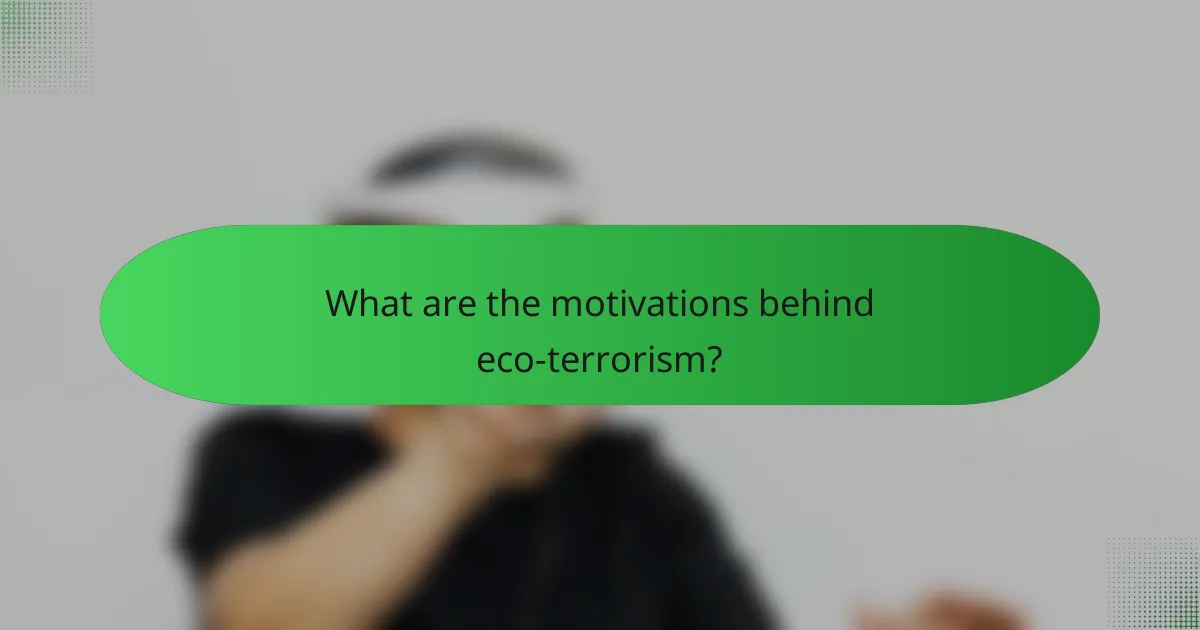
What are the motivations behind eco-terrorism?
Eco-terrorism is driven by a combination of radical beliefs and a sense of urgency to address environmental degradation. Individuals involved often feel that conventional methods of advocacy are insufficient to combat the escalating climate crisis.
Desperation to combat climate change
Many eco-terrorists are motivated by a profound desperation to combat climate change, which they perceive as an imminent threat to the planet’s survival. This urgency often stems from witnessing the detrimental effects of pollution, deforestation, and habitat destruction.
For example, activists may resort to extreme measures when they believe that legal avenues, such as lobbying or peaceful protests, have failed to yield significant results. The feeling that time is running out can push individuals toward radical actions in hopes of drawing attention to their cause.
Belief in direct action as a solution
Eco-terrorists often believe that direct action, including sabotage or property destruction, is a necessary tactic to protect the environment. They argue that such actions are justified when they aim to prevent greater harm to ecosystems and wildlife.
This belief is rooted in the idea that traditional activism is ineffective against powerful corporate interests that prioritize profit over ecological health. By taking matters into their own hands, these individuals hope to inspire others and create a sense of urgency around environmental issues.
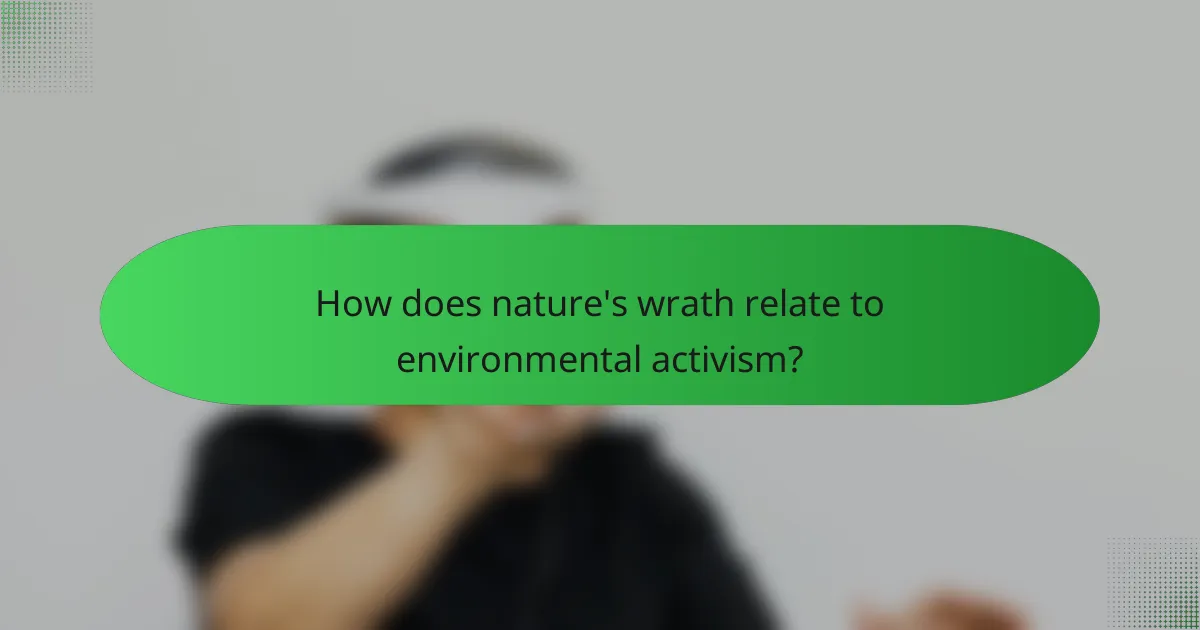
How does nature’s wrath relate to environmental activism?
Nature’s wrath, manifested through extreme weather events and natural disasters, often serves as a powerful motivator for environmental activism. These occurrences highlight the urgent need for action against climate change and can galvanize communities to adopt more radical beliefs in pursuit of ecological preservation.
Natural disasters as a catalyst for action
Natural disasters frequently trigger immediate responses from individuals and organizations advocating for environmental change. Events such as hurricanes, wildfires, and floods can lead to increased awareness about the consequences of climate change, prompting communities to mobilize for action.
For instance, after devastating hurricanes, local groups may organize clean-up efforts or advocate for stronger building regulations to mitigate future damage. These actions can reflect a shift in public sentiment, where the urgency of the situation drives people to adopt more radical approaches to environmental protection.
Public perception of climate change urgency
The public’s perception of climate change urgency has evolved significantly, especially following high-profile natural disasters. Many individuals now recognize the direct link between these events and climate change, leading to a growing demand for immediate and effective solutions.
Surveys indicate that a substantial portion of the population believes climate change poses a serious threat to future generations. This heightened awareness can lead to increased support for radical environmental policies, such as stricter emissions regulations or significant investments in renewable energy sources.
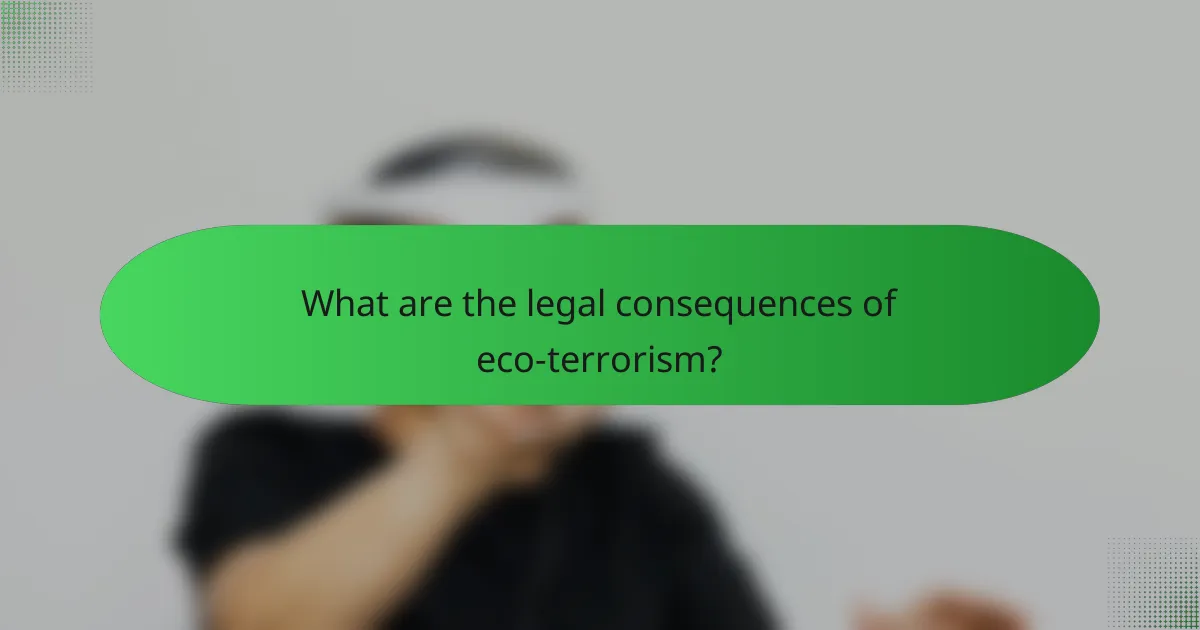
What are the legal consequences of eco-terrorism?
Eco-terrorism can lead to severe legal consequences, including criminal charges that vary by jurisdiction. Offenders may face significant penalties, including imprisonment and hefty fines, depending on the severity of their actions and the damage caused.
Criminal charges and penalties
Individuals charged with eco-terrorism may face a range of criminal charges, including arson, vandalism, and conspiracy. Penalties can vary widely, with prison sentences often ranging from several years to decades, depending on the extent of the damage and whether anyone was harmed.
In the United States, laws like the Animal Enterprise Terrorism Act specifically target actions that disrupt animal-related businesses, imposing strict penalties. In contrast, European countries may have different regulations, but serious offenses can still lead to significant jail time and fines.
Impact on environmental legislation
Eco-terrorism can influence environmental legislation by prompting stricter laws and regulations aimed at preventing radical actions. Governments may respond to eco-terrorism by tightening security measures around environmental projects and increasing penalties for related crimes.
Additionally, the negative perception of eco-terrorism can hinder legitimate environmental movements, as policymakers may become wary of supporting initiatives that could be associated with radical actions. This can slow down progress on important environmental issues, as the focus shifts to law enforcement rather than conservation efforts.
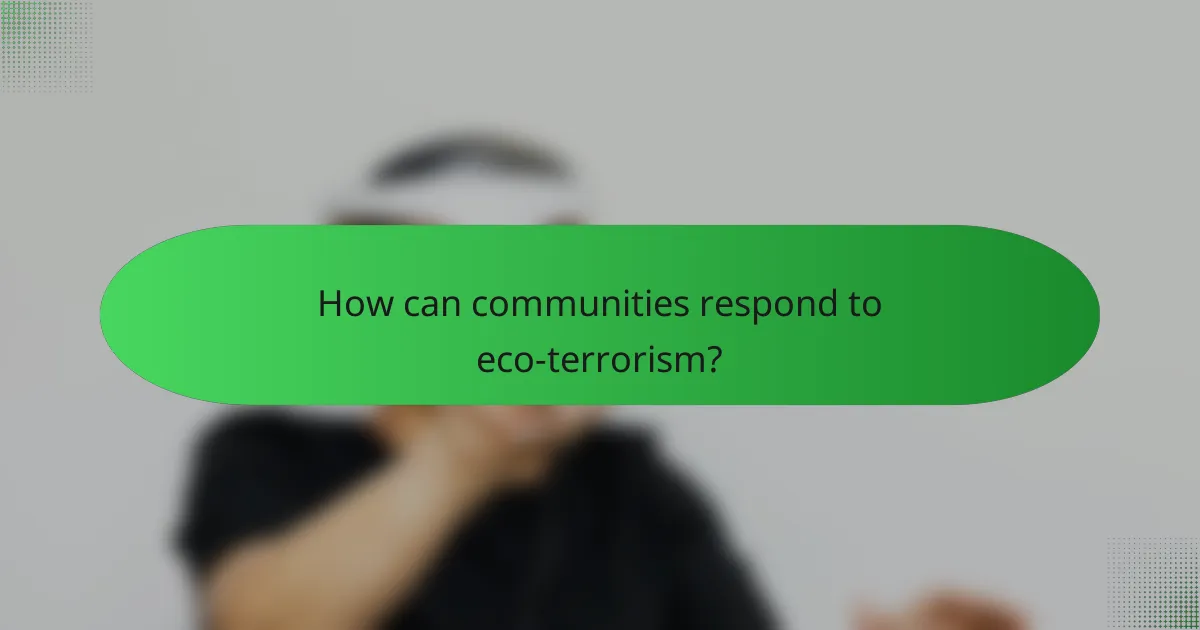
How can communities respond to eco-terrorism?
Communities can respond to eco-terrorism by fostering dialogue, promoting peaceful activism, and enhancing resilience against radical beliefs. Effective strategies include education, community engagement, and collaboration with law enforcement to prevent violent actions while addressing environmental concerns.
Promoting peaceful activism
Promoting peaceful activism involves encouraging constructive dialogue and non-violent methods to advocate for environmental issues. Communities can organize workshops, rallies, and campaigns that focus on awareness and education rather than confrontation.
Examples of peaceful activism include tree planting events, clean-up drives, and art installations that highlight environmental challenges. These initiatives not only raise awareness but also strengthen community bonds and foster a shared commitment to sustainability.
Building community resilience
Building community resilience means preparing for potential eco-terrorism by creating strong networks and support systems. This can be achieved through training programs that teach conflict resolution, emergency response, and environmental stewardship.
Communities should also develop plans that outline steps to take in the event of eco-terrorism, including communication strategies and resource allocation. Engaging local leaders and organizations can help ensure that these plans are comprehensive and effective, ultimately reducing vulnerability to radical actions.
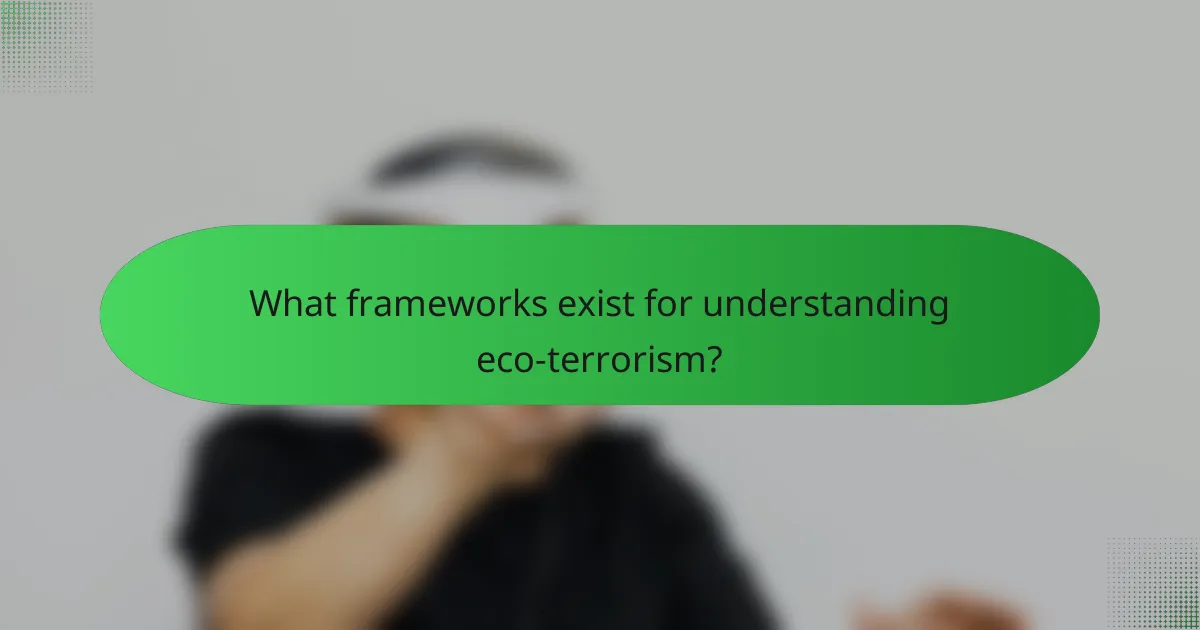
What frameworks exist for understanding eco-terrorism?
Eco-terrorism can be understood through various frameworks that analyze its motivations, methods, and impacts. These frameworks often categorize eco-terrorism based on the ideologies behind the actions, the tactics employed, and the consequences for both the environment and society.
Definitions and classifications of eco-terrorism
Eco-terrorism is typically defined as the use of violence or sabotage to achieve environmental or ecological goals. This can include actions taken by individuals or groups who believe that extreme measures are necessary to protect nature from perceived threats, such as industrial pollution or deforestation.
Classifications of eco-terrorism often differentiate between various types of actions, such as direct action, sabotage, and property destruction. Some frameworks categorize eco-terrorism based on the underlying beliefs, ranging from radical environmentalism to more mainstream conservation efforts.
Case studies of notable incidents
One notable incident of eco-terrorism is the 1996 arson attack on a U.S. Forest Service facility by the Earth Liberation Front (ELF), which aimed to protest logging practices. This incident exemplifies how groups may resort to illegal actions to draw attention to environmental issues.
Another significant case is the 2001 sabotage of a genetically modified crop field in the United States, where activists destroyed experimental crops to prevent what they viewed as harmful agricultural practices. These incidents highlight the diverse motivations and tactics used by eco-terrorists, as well as the legal and ethical debates surrounding their actions.
